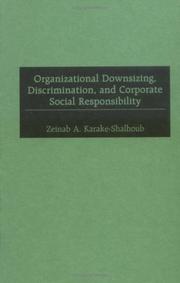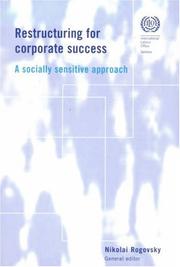
ISBN: 1567202519 9786610913763 1429473193 1280913762 0313007543 9781429473194 9780313007545 9798400693908 Year: 1999 Publisher: Westport, Conn : London : Quorum, Bloomsbury Publishing,
Abstract | Keywords | Export | Availability | Bookmark
 Loading...
Loading...Choose an application
- Reference Manager
- EndNote
- RefWorks (Direct export to RefWorks)
Social responsibility of business. --- Downsizing of organizations. --- Discrimination in employment. --- Entreprises --- Personnel --- Discrimination dans l'emploi --- Responsabilité sociale --- Réduction --- BUSINESS & ECONOMICS --- Organizational Behavior --- Management --- Business & Economics --- Management Styles & Communication --- Responsabilité sociale --- Réduction --- Bias, Job --- Employment discrimination --- Equal employment opportunity --- Equal opportunity in employment --- Fair employment practice --- Job bias --- Job discrimination --- Race discrimination in employment --- Corporate downsizing --- Organizational downsizing --- Retrenchment of organizations --- Retrenchment, Organizational --- Business --- Corporate accountability --- Corporate responsibility --- Corporate social responsibility --- Corporations --- CSR (Corporate social responsibility) --- Industries --- Social responsibility, Corporate --- Social responsibility of industry --- Social responsibility --- Employment (Economic theory) --- Organizational change --- Employees --- Business ethics --- Issues management --- Dismissal of --- Social aspects --- Affirmative action programs

ISBN: 9780470500156 0470500158 0470528591 9786612369216 1282369210 0470528575 9780470528570 9780470528594 9780470528587 0470528583 9781282369214 Year: 2009 Publisher: San Francisco : Jossey-Bass,
Abstract | Keywords | Export | Availability | Bookmark
 Loading...
Loading...Choose an application
- Reference Manager
- EndNote
- RefWorks (Direct export to RefWorks)
From the founder of ""layoff survivor sickness"" an updated edition of a book for today's downsized workforce Thoroughly revised and updated, David Noer's classic book about downsized organizations has never been more relevant. Reports of the most recent layoffs are making the front pages of our newspapers with frightening regularity. And massive downsizing continues to reshape the face of American business. But what about those who remain behind? Healing the Wounds provides an antidote to the widespread malaise on the American business scene left in the wake of workforce redu
Downsizing of organizations --- Employees --- Layoff systems. --- Organizational change --- Unemployment --- Psychological aspects. --- Dismissal of. --- Downsizing of organizations - Psychological aspects. --- Downsizing of organizations. --- Employees - Dismissal of. --- Employees -- Dismissal of. --- Organizational change - Psychological aspects. --- Organizational change -- Psychological aspects. --- Personnel management. --- Unemployment - Psychological aspects. --- Unemployment -- Psychological aspects. --- Layoff systems --- Management Styles & Communication --- Management --- Business & Economics --- Psychological aspects --- Dismissal of --- Dismissal of employees --- Employee dismissal --- Employees, Dismissal of --- Employment termination --- Firing of employees --- Notice of dismissal --- Termination of employment --- Corporate downsizing --- Organizational downsizing --- Retrenchment of organizations --- Retrenchment, Organizational --- Job security --- E-books

ISBN: 0871540940 Year: 2003 Publisher: New York Russell Sage Foundation
Abstract | Keywords | Export | Availability | Bookmark
 Loading...
Loading...Choose an application
- Reference Manager
- EndNote
- RefWorks (Direct export to RefWorks)
Downsizing of organizations --- -Industries --- -Organizational change --- -#SBIB:041.AANKOOP --- #SBIB:316.334.2A464 --- #SBIB:316.334.2A553 --- #SBIB:316.334.2A551 --- #SBIB:33H21 --- -338.64 --- Industrial production --- Industry --- Economics --- Change, Organizational --- Organization development --- Organizational development --- Organizational innovation --- Management --- Organization --- Manpower planning --- Corporate downsizing --- Organizational downsizing --- Retrenchment of organizations --- Retrenchment, Organizational --- Organizational change --- Employees --- Size --- -Arbeidssociologie: patronale strategieën op de arbeidsmarkt: sluitingen, collectieve afdankingen --- Personeelsbeleid en loonbeleid, functieclassificaties --- Partijen en strategieën in de onderneming: ondernemingsbeleid en management --- Problemen van de onderneming: algemeen --- -Dismissal of --- Industries --- 338.64 --- #SBIB:041.AANKOOP --- Arbeidssociologie: patronale strategieën op de arbeidsmarkt: sluitingen, collectieve afdankingen --- Downsizing of organization --- United States

ISBN: 0262279134 0585134634 9780585134635 0262133113 9780262279130 Year: 1995 Publisher: Cambridge, Mass. : MIT Press,
Abstract | Keywords | Export | Availability | Bookmark
 Loading...
Loading...Choose an application
- Reference Manager
- EndNote
- RefWorks (Direct export to RefWorks)
Corporate divestiture --- Downsizing of organizations --- Corporate reorganizations --- Diversification in industry --- Industrial Management --- Management --- Business & Economics --- Industrial diversification --- Product diversification --- Input-output analysis --- Barriers to entry (Industrial organization) --- Multiproduct firms --- Corporations --- Reorganization of corporations --- Industrial management --- Consolidation and merger of corporations --- Corporate downsizing --- Organizational downsizing --- Retrenchment of organizations --- Retrenchment, Organizational --- Organizational change --- Employees --- Corporate spinoffs --- Divestiture, Corporate --- Divestment, Corporate --- Spinoffs, Corporate --- Disinvestment --- Case studies. --- Case studies --- Reorganization --- Dismissal of --- Divestiture --- 658.114 --- 658.114 Forms of enterprise in general. Private businesses --- Forms of enterprise in general. Private businesses
Book
ISBN: 1501717103 9781501717109 9781501717116 1501717111 9781501717093 150171709X 9781501717093 1501755307 9781501755309 Year: 2018 Publisher: Ithaca, NY : Cornell University Press,
Abstract | Keywords | Export | Availability | Bookmark
 Loading...
Loading...Choose an application
- Reference Manager
- EndNote
- RefWorks (Direct export to RefWorks)
In this bold new perspective on the United States-China power transition, Paul K. MacDonald and Joseph M. Parent examine all great power transitions since 1870. They find that declining and rising powers have strong incentives to moderate their behavior at moments when the hierarchy of great powers is shifting. How do great powers respond to decline? they ask. What options do great powers have to slow or reverse their descent?In Twilight of the Titans, MacDonald and Parent challenge claims that policymakers for great powers, unwilling to manage decline through moderation, will be pushed to extreme measures. Tough talk, intimidation, provocation, and preventive war, they write, are not the only alternatives to defeat. Surprisingly, retrenchment tends not to make declining states tempting prey for other states nor does it promote domestic dysfunction. What retrenchment does encourage is resurrection. Only states that retrench have recovered their former position.MacDonald and Parent show how declining states tend to behave, what policy options they have to choose from, how rising states respond to decline, and what conditions reward which strategies. Using case studies that include Great Britain in 1872 and 1908, Russia in 1888 and 1903, and France in 1893 and 1924, Twilight of the Titans offers clear evidence that declining powers have a wide array of options at their disposal and offers guidance on how to use the right tools at the right time. The result is a comprehensive rethinking of power transition and hegemonic war theories and a different approach to the policy problems that declining states face. What matters most, the authors write, is the strategic choices made by the great powers.
International relations. --- Regression (Civilization) --- Hegemony. --- Great powers. --- Powers, Great --- Super powers --- Superpowers --- World politics --- Hegemonism --- Political science --- Sociology --- Unipolarity (International relations) --- Decline of civilization --- Civilization --- Progress --- Coexistence --- Foreign affairs --- Foreign policy --- Foreign relations --- Global governance --- Interdependence of nations --- International affairs --- Peaceful coexistence --- World order --- National security --- Sovereignty --- Philosophy --- realist foreign policy, cutting the defense budget, decline and retrenchment.
Book
Year: 2013 Publisher: Washington, D.C., The World Bank,
Abstract | Keywords | Export | Availability | Bookmark
 Loading...
Loading...Choose an application
- Reference Manager
- EndNote
- RefWorks (Direct export to RefWorks)
This paper assesses European bank deleveraging and its impact on global credit conditions. Before the onset of the global financial crisis, European banks had rapidly expanded their foreign lending activities. However, European banks have since been tightening credit conditions in Europe more for longer-term lending, a trend that banks expect to continue. European financial stress has been transmitted to emerging markets that have experienced a sustained deterioration of credit standards and funding conditions. As a result, European lending in emerging markets has been lagging behind lending of other international banks although European banks remain a dominant source of funding. "Good" bank deleveraging is still necessary from a prudential perspective. Although acute "bad" deleveraging pressures due to financial stress, which can trigger a credit crunch, have subsided recently on account of decisive policy measures, tail risks remain. Curtailing lending will probably be a core component of this multi-year deleveraging process. Taken together, European bank deleveraging warrants close attention.
Access to Finance --- Bad deleveraging --- Bankruptcy and Resolution of Financial Distress --- Banks & Banking Reform --- Credit --- Debt Markets --- Deleveraging --- Emerging markets --- European banks --- Finance and Financial Sector Development --- Financial Intermediation --- Financial stress --- Good deleveraging --- Loan maturities --- Long-term finance --- Private Sector Development --- Project finance --- Retrenchment --- Syndicated loans --- Tightening credit standards --- Trade finance
Book
ISBN: 1479832316 9781479832316 9781479824045 1479824046 9781479874927 1479874922 9781479836482 1479836486 Year: 2019 Publisher: New York New York University Press
Abstract | Keywords | Export | Availability | Bookmark
 Loading...
Loading...Choose an application
- Reference Manager
- EndNote
- RefWorks (Direct export to RefWorks)
The essential guide to understanding how racism works and how racial inequality shapes black lives, ultimately offering a road-map for resistance for racial justice advocates and antiracists When #BlackLivesMatter went viral in 2013, it shed a light on the urgent, daily struggles of black Americans to combat racial injustice. The message resonated with millions across the country. Yet many of our political, social, and economic institutions are still embedded with racist policies and practices that devalue black lives. Stay Woke directly addresses these stark injustices and builds on the lessons of racial inequality and intersectionality the Black Lives Matter movement has challenged its fellow citizens to learn.In this essential primer, Tehama Lopez Bunyasi and Candis Watts Smith inspire readers to address the pressing issues of racial inequality, and provide a basic toolkit that will equip readers to become knowledgeable participants in public debate, activism, and politics. This book offers a clear vision of a racially just society, and shows just how far we still need to go to achieve this reality. From activists to students to the average citizen, Stay Woke empowers all readers to work toward a better future for black Americans.
USA --- Movement for Black Lives. --- US politics. --- accessible. --- activism. --- antiracism. --- antiracist. --- civil rights movement. --- colorblind racial attitudes. --- concrete steps. --- egalitarianism. --- electoral politics. --- everyday people. --- evidence. --- freedom fighters. --- inequality. --- inspiration. --- instruction. --- intersectionality. --- local politics. --- policy change. --- postracist. --- race. --- racial disparities. --- racial progress. --- racism. --- radical change. --- reproducing racial inequity. --- resistance. --- retrenchment. --- social movements. --- state politics. --- statistics. --- toolkit.

ISBN: 0521482097 0521484324 0511625650 Year: 1997 Publisher: Cambridge : Cambridge University Press,
Abstract | Keywords | Export | Availability | Bookmark
 Loading...
Loading...Choose an application
- Reference Manager
- EndNote
- RefWorks (Direct export to RefWorks)
Heroic Defeats is a comparative investigation of how unions and firms interact when economic circumstances require substantial job loss. Using simple game theory to generate testable propositions about when these situations will result in industrial conflict, Professor Golden illustrates the theory in a range of situations between 1950 and 1985 in Japan, Italy, and Britain. Additionally, the author shows how the theory explains why strikes over job loss almost never occur in postwar unionised firms in the United States. With its blend of rational choice and comparative politics, Heroic Defeats is the first systematic attempt to account for industrial conflict or its absence in situations of mass job loss. This book should be of interest to political scientists, sociologists, economists, and students of labour and industrial relations, as well as specialists in European and Japanese history.
Downsizing of organizations --- Labor unions --- Labor disputes --- Personnel --- Syndicats --- Travail --- Case studies. --- Case studies --- Réduction --- Cas, Etudes de --- Conflits --- -Labor disputes --- -Labor unions --- -#SBIB:316.334.2A452 --- #SBIB:316.334.2A561 --- #SBIB:HIVA --- Industrial unions --- Labor, Organized --- Labor organizations --- Organized labor --- Trade-unions --- Unions, Labor --- Unions, Trade --- Working-men's associations --- Labor movement --- Societies --- Central labor councils --- Guilds --- Syndicalism --- Actions, Job --- Disputes, Labor --- Industrial disputes --- Job actions --- Industrial relations --- Corporate downsizing --- Organizational downsizing --- Retrenchment of organizations --- Retrenchment, Organizational --- Organizational change --- Employees --- Arbeidssociologie: syndicale actievormen en strategieën m.b.t. de werkloosheid --- Partijen en strategieën in de onderneming: staking en lock-out --- Law and legislation --- Dismissal of --- Réduction --- #SBIB:316.334.2A452 --- Social Sciences --- Political Science

ISBN: 9221154300 9221154319 1280435763 Year: 2005 Publisher: Geneva : International Labour Office,
Abstract | Keywords | Export | Availability | Bookmark
 Loading...
Loading...Choose an application
- Reference Manager
- EndNote
- RefWorks (Direct export to RefWorks)
Provides guidance on establishing a strategy of worker retention and worker displacement that will minimize the negative social impact of enterprise restructuring and respect the provisions of international labour standards. Looks at the reasons for workforce reduction and its impact on the individual and the company and sets out alternative options that managers should consider. Includes examples of best practice.
Displaced workers -- Services for. --- Downsizing of organizations. --- Employees -- Dismissal of. --- Social responsibility of business. --- Downsizing of organizations --- Displaced workers --- Employees --- Social responsibility of business --- Commerce --- Business & Economics --- Marketing & Sales --- Services for --- Dismissal of --- Business --- Corporate accountability --- Corporate responsibility --- Corporate social responsibility --- Corporations --- CSR (Corporate social responsibility) --- Industries --- Social responsibility, Corporate --- Social responsibility of industry --- Laborers --- Personnel --- Workers --- Dislocated workers --- Displaced employees --- Employees, Displaced --- Workers, Displaced --- Corporate downsizing --- Organizational downsizing --- Retrenchment of organizations --- Retrenchment, Organizational --- Social responsibility --- Dismissal of. --- Business ethics --- Issues management --- Persons --- Industrial relations --- Personnel management --- Unemployed --- Organizational change --- Social aspects --- #SBIB:316.334.2A551 --- #SBIB:316.334.2A553 --- Dismissal of employees --- Employee dismissal --- Employees, Dismissal of --- Employment termination --- Firing of employees --- Notice of dismissal --- Termination of employment --- Partijen en strategieën in de onderneming: ondernemingsbeleid en management --- Personeelsbeleid en loonbeleid, functieclassificaties --- Services for.

ISBN: 1280207337 9786610207336 0306471817 0306463008 Year: 2002 Publisher: New York, New York : Kluwer Academic Publishers,
Abstract | Keywords | Export | Availability | Bookmark
 Loading...
Loading...Choose an application
- Reference Manager
- EndNote
- RefWorks (Direct export to RefWorks)
The background for the international research conference “Health Hazards and Challenges in the New Working Life” was the emerging questions concerning the health and social effects of the rapid changes in the labour market leading to increasing long-term unemployment, temporary employment and irregular employment contracts. We knew that other countries have had this development at the labour market for a much longer time than Sweden has and it seemed a good idea to invite interested researchers and practitioners to an international seminar to share the relevant research findings and discuss future research needs. Thus, the first international, interdisciplinary research conference on “Health Hazards and Challenges in the New Working Life” was arranged in Stockholm during the last year of the 2nd millennium but was directed towards the foreseen development during the next millennium. We were very pleased that more than 200 participants came to a cold and dark country just after New Year’s Eve, and that it was a truly multidisciplinary setting. It became very obvious that it is necessary for the occupational health and safety research community to reach out to the public health research community as well as to the social and political sciences in order to understand the determinants and to perform comprehensive analyses at several levels in this new labour market situation.
Unemployed --- Unemployment --- Downsizing of organizations --- Job stress --- Health and hygiene --- Health aspects --- Psychology. --- Sociology. --- Health psychology. --- Personality. --- Social psychology. --- Personality and Social Psychology. --- Sociology, general. --- Health Psychology. --- Arbeids- en organisatiepsychologie --- arbeidsmarkt. --- Consciousness. --- Psychology, clinical. --- Health psychology --- Health psychology, Clinical --- Psychology, Clinical health --- Psychology, Health --- Salutogenesis --- Clinical psychology --- Medicine and psychology --- Social theory --- Social sciences --- Mass psychology --- Psychology, Social --- Human ecology --- Psychology --- Social groups --- Sociology --- Personal identity --- Personality psychology --- Personality theory --- Personality traits --- Personology --- Traits, Personality --- Individuality --- Persons --- Self --- Temperament --- Corporate downsizing --- Organizational downsizing --- Retrenchment of organizations --- Retrenchment, Organizational --- Organizational change --- Employees --- Occupational stress --- On-the-job stress --- Organizational stress --- Stress in the workplace --- Work stress --- Workplace stress --- Psychology, Industrial --- Stress (Physiology) --- Stress (Psychology) --- Work --- Jobless people --- Out-of-work people --- Unemployed people --- Unemployed workers --- Labor supply --- Joblessness --- Employment (Economic theory) --- Full employment policies --- Manpower policy --- Underemployment --- Dismissal of --- Physiological aspects --- Psychological aspects

 Search
Search Feedback
Feedback About UniCat
About UniCat  Help
Help News
News